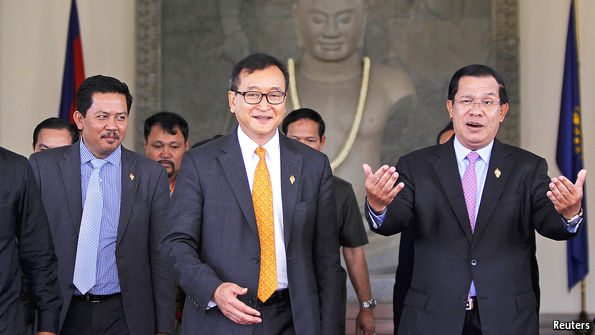Cambodian politics
The trap is laid
A period of political rapprochement appears to be at an end
 Sam Rainsy and Hun Sen: the honeymoon is over
Sam Rainsy and Hun Sen: the honeymoon is over
Phnom Penh -- EVEN before it has become clear quite how Aung San Suu Kyi can govern
in Myanmar, the Nobel laureate’s electoral landslide has sent ripples
across the neighbourhood—nowhere more so than in Cambodia. On a trip to
Japan the country’s opposition leader, Sam Rainsy, could not resist
comparing himself to Miss Suu Kyi. Her victory, he added, “has created
panic among the last surviving dictators in our part of the world, but
the wind of freedom …will also reach Cambodia in the very near future.”
Even if Mr Sam Rainsy’s claim to Miss Suu Kyi’s moral status is a
stretch, the Myanmar parallel is not. The prime minister, Hun Sen, a
former commander under the Khmer Rouge regime, has ruled Cambodia with
an iron grip for 30 years, in part [strike, insert "full"] by rigging elections. After a recent
period of rapprochement with the opposition Cambodia National Rescue
Party (CNRP), the government has turned mean again.
Late last month Kun Kim, the army’s deputy commander, who is very close to the prime minister, urged the removal of Mr Sam Rainsy’s deputy, Kem Sokha, as the National Assembly’s vice-president. The assembly, dominated by the ruling Cambodian People’s Party (CPP), obliged. Hundreds of CPP hoodlums had previously spent hours hurling rocks at Mr Kem Sokha’s house, his terrified family inside. Two opposition lawmakers were beaten up outside the National Assembly.
Now Mr Sam Rainsy’s comments have blown Mr Hun Sen’s fuse. The
opposition leader, he spat, was “the son of a traitor” (in 1959 Mr Sam
Rainsy’s pro-Western father plotted against the late king, a fan of Mao
Zedong). On November 13th a court in Phnom Penh, the capital, issued a
warrant for Mr Sam Rainsy’s arrest on a long-dormant conviction for the
defamation of a CPP heavyweight.
Three days later the National Assembly revoked Mr Sam Rainsy’s
parliamentary immunity. Rather than fly into Phnom Penh late that night
and risk a showdown, the opposition leader stayed away. He says he will
remain abroad, though only for a matter of days. Arriving in the dark of
night, he says, would have given CPP thugs an excuse for violence
against his supporters coming to meet him at the airport. Besides, Asian
diplomats and others have asked him to stay away for a time so that
they can help to calm the prime minister’s temper.
Even if these interlocutors succeed, a half-year rapprochement
between the two men appears over, and the future of Mr Sam Rainsy’s
much-vaunted “culture of dialogue” in doubt. It was always an unlikely
truce, but Mr Hun Sen had seemed to want an end to his stand-off with
the CNRP. The party claimed it would have won the general election in
2013 had Mr Hun Sen not rigged the outcome. Street protests, often
violent, followed, along with a crackdown on dissidents. But from April
this year suddenly all was sweetness and light, and the two men began
appearing in public together, along with their wives. Not everybody in
the CNRP approved.
Now, Mr Sam Rainsy describes the 63-year-old prime minister (who has
said he intends to rule for another decade) as panicked. He calls it “a
kind of a constitutional coup when you want to arrest the leader of the
opposition”. The CPP has immense powers of patronage, and is able to
mobilise its supporters across the country. But, says Mr Sam Rainsy,
with many younger, better-informed Cambodians coming to the opposition
via social media, “the trend is now in our favour”. He says he believes
the prime minister has a premonition that his days are numbered.
Despite all this, Mr Sam Rainsy says he wants to keep alive the
spirit of dialogue, at least with more amenable parts of the CPP which,
alongside a ruthless and corrupt old guard, also has its modernisers.
Above all, he says, the opposition must keep its sights on the next
general election, due by 2018. It must not allow the ruling party to use
violence as a pretext for declaring a state of emergency and even
cancelling the elections. “We are not going to fall into their trap,” he
says. But if he does return—and he is aware that running off to Paris,
as he has done in the past, will dent his reputation—the trap may prove
hard to avoid. It is a delicate and possibly dangerous moment for
Cambodia.


No comments:
Post a Comment